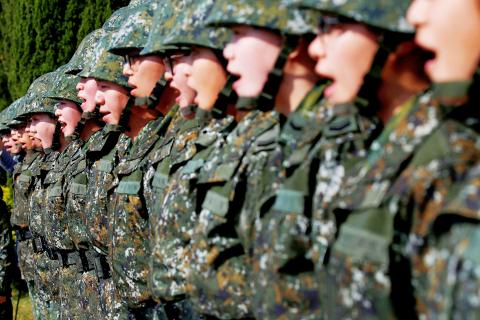Production of Tien Kung III (“Sky Bow III”) and Hsiung Feng III (“Brave Wind III”) missiles should be sped up, provided that quality is not affected, President Tsai Ing-wen (蔡英文) said yesterday, adding that higher production rates are needed as the Chinese military threat grows.
Tsai made the remarks during a visit to the Chungshan Institute of Science and Technology with National Security Council Secretary-General David Lee (李大維), Minister of National Defense Yen De-fa (嚴德發) and Chief of General Staff Lee Hsi-ming (李喜明) to boost morale among research staff.
The officials were briefed on the mass production of missiles before inspecting the facility.

Photo: Tyrone Siu, Reuters
This year marks the 50th anniversary of the institute’s founding and personnel should be commended for embodying the founding spirit of the institute: to ensure Taiwan’s defense autonomy and national security in the face of changing external circumstances, Tsai said.
The Tien Kung III and Hsiung Feng III missiles, which help Taiwan maintain a formidable defense, are the pride of the institute, but their success is due to the diligence of generations of researchers, Tsai said.
“The institute’s researchers laid the foundation for its success by daring to brave the challenges they faced and learning from their failures,” she said, citing the institute’s motto: unwavering patriotism, innovative creativity, pragmatic application of the scientific method and the spirit of teamwork.
As the commander-in-chief of the armed forces, Tsai said she is well aware of the institute’s importance and has increased its funding.
She said she has also sought to improve relations between the institute and the Ministry of National Defense to ensure that the institute’s knowledge would find suitable applications.
Tsai called on Yen, who doubles as the institute’s chairman, and Deputy Minister of National Defense Chang Kuan-chun (張冠群) to carefully plan the future development of the institute, focusing on expediting the manufacturing of quality missiles.

Alain Robert, known as the "French Spider-Man," praised Alex Honnold as exceptionally well-prepared after the US climber completed a free solo ascent of Taipei 101 yesterday. Robert said Honnold's ascent of the 508m-tall skyscraper in just more than one-and-a-half hours without using safety ropes or equipment was a remarkable achievement. "This is my life," he said in an interview conducted in French, adding that he liked the feeling of being "on the edge of danger." The 63-year-old Frenchman climbed Taipei 101 using ropes in December 2004, taking about four hours to reach the top. On a one-to-10 scale of difficulty, Robert said Taipei 101

Nipah virus infection is to be officially listed as a category 5 notifiable infectious disease in Taiwan in March, while clinical treatment guidelines are being formulated, the Centers for Disease Control (CDC) said yesterday. With Nipah infections being reported in other countries and considering its relatively high fatality rate, the centers on Jan. 16 announced that it would be listed as a notifiable infectious disease to bolster the nation’s systematic early warning system and increase public awareness, the CDC said. Bangladesh reported four fatal cases last year in separate districts, with three linked to raw date palm sap consumption, CDC Epidemic Intelligence

US climber Alex Honnold left Taiwan this morning a day after completing a free-solo ascent of Taipei 101, a feat that drew cheers from onlookers and gained widespread international attention. Honnold yesterday scaled the 101-story skyscraper without a rope or safety harness. The climb — the highest urban free-solo ascent ever attempted — took just more than 90 minutes and was streamed live on Netflix. It was covered by major international news outlets including CNN, the New York Times, the Guardian and the Wall Street Journal. As Honnold prepared to leave Taiwan today, he attracted a crowd when he and his wife, Sanni,

Taiwanese and US defense groups are collaborating to introduce deployable, semi-autonomous manufacturing systems for drones and components in a boost to the nation’s supply chain resilience. Taiwan’s G-Tech Optroelectronics Corp subsidiary GTOC and the US’ Aerkomm Inc on Friday announced an agreement with fellow US-based Firestorm Lab to adopt the latter’s xCell, a technology featuring 3D printers fitted in 6.1m container units. The systems enable aerial platforms and parts to be produced in high volumes from dispersed nodes capable of rapid redeployment, to minimize the risk of enemy strikes and to meet field requirements, they said. Firestorm chief technology officer Ian Muceus said